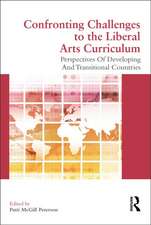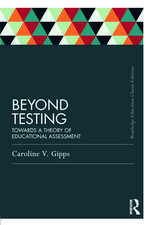The Routledge International Companion to Educational Psychology
Editat de Andrew J. Hollimanen Limba Engleză Paperback – 17 iul 2013
- educational psychology (history, child rights, and practice);
- factors which influence children’s learning and development;
- issues to do with assessment (a key aspect of educational psychology);
- special educational needs (identification and how to meet their needs);
- the key thinkers, events, and ideas that have shaped the field;
- the core topics across educational psychology in an accessible manner;
- cutting edge research including recent research evidence and theory;
- future directions in the field of educational psychology;
- educational psychology from an international perspective.
Preț: 420.92 lei
Preț vechi: 555.18 lei
-24% Nou
Puncte Express: 631
Preț estimativ în valută:
80.55€ • 83.79$ • 66.50£
80.55€ • 83.79$ • 66.50£
Carte tipărită la comandă
Livrare economică 14-28 aprilie
Preluare comenzi: 021 569.72.76
Specificații
ISBN-13: 9780415675604
ISBN-10: 041567560X
Pagini: 376
Ilustrații: 19 black & white illustrations, 5 black & white tables
Dimensiuni: 174 x 246 x 23 mm
Greutate: 0.7 kg
Ediția:New.
Editura: Taylor & Francis
Colecția Routledge
Locul publicării:Oxford, United Kingdom
ISBN-10: 041567560X
Pagini: 376
Ilustrații: 19 black & white illustrations, 5 black & white tables
Dimensiuni: 174 x 246 x 23 mm
Greutate: 0.7 kg
Ediția:New.
Editura: Taylor & Francis
Colecția Routledge
Locul publicării:Oxford, United Kingdom
Public țintă
PostgraduateCuprins
1. A history of educational psychology; 2. The rights of the child; 3. Introduction to educational psychology practice; 4. A comparative overview of educational psychology across continents; 5. Theories of teaching and learning; 6. Effective teaching practices and classroom management: the role of ecological and inclusive understandings; 7. Educational dialogues; 8. Learning to read around the world; 9. Digital technology as enrichment of young children’s literacy environment; 10. The development of scientific reasoning; 11. Motivation to learn; 12. Children’s relationships and the family; 13. Childhood stress and its impact on learning and academic performance; 14. Classroom assessments: informing teaching and supporting learning; 15. Diagnostic assessment: one of the effective ways of assessing learning; 16. Purposes, approaches and tensions in assessment policy and practice; 17. Language use and assessment; 18. Multicultural education: the mismeasured but important phenomenon; 19. Intelligence and individual differences; 20. New frontiers in education neuroscience; 21. Labelling in special education: where do the benefits lie?; 22. Education and disability: a space where we belong or is history repeating itself?; 23. Educational psychology and the development of inclusive education; 24. Education of children with sensory needs: reducing barriers to learning for children with visual impairment; 25. Speech and language disorders; 26. The autism spectrum; 27. Social, emotional and behavioural difficulties (SEBD): the need to look beyond the problem; 28. Attention Deficit Hyperactivity Disorder: characteristics, identification, and treatment; 29. Dyslexia; 30. Practical implications from research into dyspraxia; 31. Dyscalculia: research and practice on identification and intervention across languages; 32. Meeting the needs of gifted learners
Notă biografică
Andrew J. Holliman is a researcher of children’s learning and development, a chartered psychologist, and a senior lecturer in developmental psychology at the University of Coventry.
Descriere
With over 30 chapters, the volume is divided into four themed sections: ‘An introduction to educational psychology’, ‘How children learn and develop’, ‘Issues concerning the assessment of children’ and ‘Identifying and meeting the needs of children with learning difficulties’. Covering the key issues and fundamental strands of educational psychology The Routledge International Companion to Educational Psychology aims to provide the reader with knowledge of:
- educational psychology (history, child rights, and practice);
- factors which influence children’s learning and development;
- issues to do with assessment (a key aspect of educational psychology);
- special educational needs (identification and how to meet their needs);
- the key thinkers, events, and ideas that have shaped the field;
- the core topics across educational psychology in an accessible manner;
- cutting edge research including recent research evidence and theory;
- future directions in the field of educational psychology;
- educational psychology from an international perspective.










